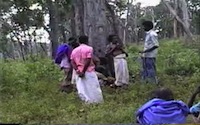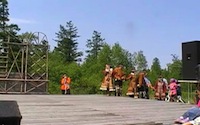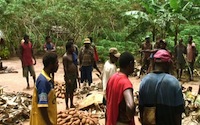The word Wichi is a self-denomination. The Wichi are also known as Mataco,
a pejorative term that several authors have claimed is of Spanish
origin and means “an unimportant animal.” Until the nineteenth century,
and in some cases until the early 1900s, the lifestyles of many Wichi
groups had not been endangered by the society around them. The minimum
social unit was an extended family of two generations. A group of
families that shared a particular territory constituted a
socio-political unit that anthropological literature refers to as
“band.” In turn, several of these bands joined together to form larger
political alliances (Braunstein 1983). As long as the bands were large
in number, the Wichi practiced endogamy. They depended on gathering,
hunting, and fishing, and to a lesser degree on agricultural
activities, all of which were organized according to the conditions of
the ecosystem and to their seasonal nomadic circuit.
From the sixteenth century, Spanish conquerors pressured the local
population until they were forced to relocate along the Bermejo River
in the late 1700s (Kersten 1986). As from 1884, Benjamin Victorica, the
War Minister, launched a military campaign to occupy the land and
submit the regional population. The objective of the campaign, which
ended in the 1920s, was to conquer the indigenous population and obtain
workers for the mills, sawmills, and cotton plantations. Military
control over the area and the growing incorporation of indigenous
workers were two factors that gradually led to the sedentarization of
these groups.
In the early seventeenth century the Catholic Church had made several
unsuccessful attempts to evangelize the Wichi. This was not the case of
the South American Mission of the Anglican Church that was able to
consolidate its position in a large part of the Wichi world in the
1940s.
At the beginning of the twentieth century, the growing relationships
with new White cattle breeders and farmers generated ceaseless
conflicts over the land. Moreover, the incorporation of cattle produced
a progressive deterioration in the ecosystem. At the time, the Wichi
were employed as a workforce in the emerging peripheral capitalism.
They were hired as cheap labor in the sugar-cane plantations in the
provinces of Salta, Jujuy, and Chaco. In sum, the establishment of
churches, the building of roads, the employment in the mills, sawmills,
and cotton plantations, the gradual development of villages, the
deterioration of the ecosystem, and the access to food staples all
conditioned the definitive sedentarization of the indigenous
population. The residents of many settlements currently hold communal
land titles of the small lots on which they live. In the early 1980s
the Wichi adopted Evangelism to which they incorporated their own
shamanic practices.
Woman collecting carob.
Carob pods.
Wichi woman spinning chaguar.
Chaguar string and piece of fabric.
The Jewish harp, a musical instrument.
Elderly woman.
Anglican ceremony.
Landscape with dwellings.
Channel
Signs at the entrance of the Community of Tres Pozos
School







